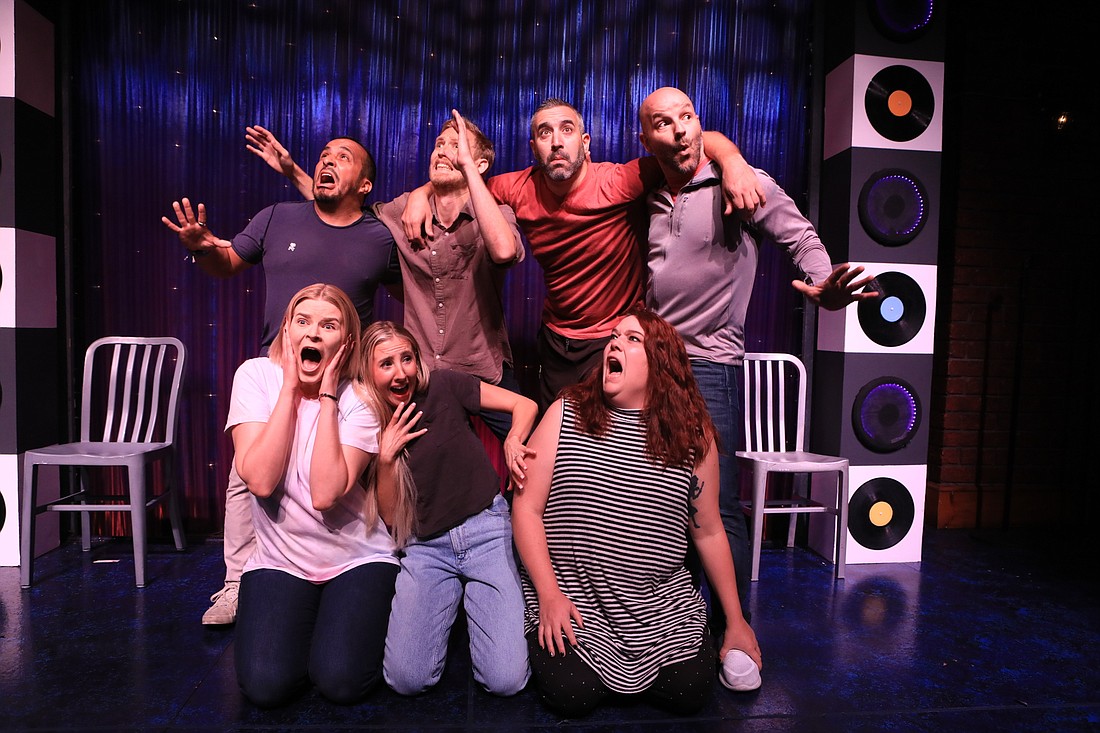- December 26, 2024
-
-
Loading

Loading

The town has been overrun by gremlins. The White House has been obliterated by aliens.
A plane is coming in for a night landing with no experienced pilot on board.
Or something like that.
For eight weeks this summer, the six-member cast of Florida Studio Theatre’s “We’re Doomed” will improvise a disaster movie on the spot. They’ll come out and ask the audience to vote on a title, and then they’ll make up their roles and the plot to fill the 90 minutes quip by quip.
No two shows are the same, but they’re all rooted in the same discipline.
"Some days. I'm not going to be the queen of the show," says cast member Sarah Durham. "Some days, I'm going to be the D plot and I have to be OK with that. But once you've done it for a while, it's just as fun to watch your teammates succeed and get those big laughs as it is for yourself to get the big laugh.”
Will Luera, Florida Studio Theatre’s Director of Improvisation, both directs and acts in “We’re Doomed,” and he says the hard work is done before they ever step on the stage.
The cast participates in a brainstorming exercise called the Genre Cauldron that helps them appreciate what they each think is funny in a given situation. They're building rapport, an understanding of how and why these movies work on our psychology. The unifying thing about disaster movies is that we watch them because we’re rooting for the characters to beat the odds, and Luera says that’s because we see ourselves in each of the roles they play.
“I think in these movies that have heavy archetypes, whether subconsciously or consciously, you're placing yourself in there,” says Luera. “Who would I be in this situation? Am I going to be the protagonist? Am I the overthinker? Am I the cynical character? The crazy conspiracy theorist? Am I the love interest or am I the follower? Am I the villain, the one that's causing this? I think it's very easy to watch these and find a character you bond with."
One member of the cast, Valerie Dale, was recently a member of the FST summer intensives and she worked on scenarios just like this with Luera as her instructor. Now she’s a full-fledged cast member, and for Luera, the show is a natural extension of his work with students.
The format of "We're Doomed" is simple. Every night, the cast comes out and asks the audience to vote on a title. And then they perform it, no questions asked, without huddling or even whispering in each other’s ear.
That’s the art form, and it doesn’t matter what title you’ve suggested; they’ll find something funny in it.
“Sometimes the audience comes up with a title that maybe doesn't sound like a disaster movie. Then it’s up to us,” says Luera. “If the title is, ‘Planting Flowers With Mom,’ OK, we'll take it. If you vote for it, we'll do it.
"We’re not going to milk anything more out of the title. We’re not going to ask you to change anything. But we will turn that title into a disaster movie.”
After they have the title, they’ll start with a “wide shot,” which allows the cast members to introduce each other and to subtly take cues about where the story is going.
If you watch closely enough, you can see their wheels turning as they each figure out their role.
That’s part of the magic; the cast doesn’t know where they’re going any more than the audience does.
They’re listening for the collaborative signals their fellow castmates are throwing down, and they’re adding details to the theatrical stew with every sentence.
“Once we all kind of find an overlapping space, then within that we start to play,” says Luera. “There's a certain tension and releasing of tension that is important for disaster movies.
"If you look at the Poseidon Adventure, you're still 25 minutes into it and they still haven't had the New Year's Eve party. You’ve got to build up to that moment when everything goes wrong.”
Anything can go wrong. And everything can go wrong. And that can be liberating for a performer.
But it all unfolds so quickly, and it can get away from them if they’re not careful.
“if we create aliens and tidal waves, and we create a building that's burning down, and we create a hostage situation, we have to solve all those problems,” says Durham.
“The more problems we create, the harder it is to actually have a narrative through-line. Otherwise, we're just trying to figure out how to take on each adversary that is thrown our way.”
The performers, whatever role they play, have to wear a lot of hats. Literally. Durham said she played seven different characters in one Halloween show, each of them signified by a different item of clothing.
One of them wore glasses, and another wore a hard hat or a letterman’s jacket.
Since this is a disaster movie, it’s a cast that requires fleshing out. The audience frequently gets enlisted in these shows, and they have to be just as quick on their feet as the cast.
But that’s not a problem, because most of them have imagined escaping their own Titanic.
“I think that audiences are a lot more intuitive than we give them credit for,” says Luera. “If you just set up the right space, they'll jump right in. If we need extra soldiers to fight the zombies or extra zombies to fight the soldiers, they'll jump right in. They've never failed me.”